Does democracy feel… static?
Like a ritual performed every few years – casting a vote – that somehow fails to capture the richness of our lives, the urgency of our problems, or the diversity of our communities? If you feel a disconnect between the promise of "rule by the people" and the reality of governance that often feels remote, exclusionary, short-sighted, and ill-equipped for 21st-century complexities, you're touching on a critical insight: perhaps the most profound gap in modern democracy is our tendency to view it as a fixed system rather than an evolving practice.
Traditional models, often centered on sporadic elections within geographic boundaries, struggle. They don't adequately account for how issues impact different people differently, lack mechanisms for deep, informed deliberation across diverse viewpoints, bake in structural short-termism, and frequently leave marginalized groups feeling unheard and powerless. The good news? This isn't an end state. Across the globe, thinkers, activists, technologists, and even some governments are experimenting with a fascinating array of innovations designed to make democracy more vital, more inclusive, and more effective. It's time to move beyond simply tweaking the old model and start reimagining democracy from the ground up, using a practical toolkit of emerging solutions.
The Toolkit for Vital Inclusion: Upgrading Democracy's Operating System
Think of these innovations not as replacements, but as potential upgrades and modules for democracy's operating system, designed to address specific deficits and enhance its capabilities:
1. Deepening and Diversifying Participation (Beyond the Ballot Box): The goal here is to shift from passive, periodic voting to continuous, manageable, and meaningful civic engagement year-round, empowering citizens between elections.
Digital Agora & Platforms: Online civic squares are becoming a reality. Platforms like Barcelona's Decidim allow citizens to propose ideas, collaboratively draft solutions, debate policies, access verified information, and participate in consultations anytime, anywhere. This breaks the bottleneck of slow, formal processes, lowers barriers to entry, and enables ongoing dialogue between citizens and government.
Participatory Budgeting (PB): Already implemented in thousands of cities worldwide, PB gives citizens direct power to decide how a portion of public money is spent, typically starting locally. It's proven to empower communities (especially marginalized ones), build trust through transparency, foster practical civic education about budgets, and lead to more responsive and equitable resource allocation. There's exciting potential to scale this concept to regional or even specific national budget areas.
Community-Based Decision-Making (Hyperlocal Power): Decentralizing certain powers to neighbourhood parliaments, micro-councils, or community boards can make democracy tangible. Addressing local needs directly builds social capital through collaboration, fosters a stronger sense of ownership, and allows for tailored solutions that larger government bodies might miss.
2. Enhancing Representation and Deliberation (Beyond Professional Politicians): If decisions are to be legitimate and wise, the bodies making them need to reflect the populace more accurately and engage in informed, reasoned dialogue, moving beyond partisan gridlock.
Citizens' Assemblies, Juries & Minipublics: This is arguably one of the most impactful innovations gaining traction globally. By randomly selecting a group of citizens demographically representative of the wider population (using sortition), we create 'minipublics.' These assemblies are given time, access to balanced information from experts and stakeholders, and skilled facilitation to deliberate deeply on complex issues (climate policy, infrastructure projects, constitutional questions). Their recommendations can provide invaluable guidance to governments, break political logjams, and foster informed public judgment. Some models even grant binding authority in defined areas. This approach brings diverse lived experiences directly into policy-making and can be scaled through nested assemblies (local, regional, national).
Sortition for Oversight Roles: Beyond advisory assemblies, randomly selected citizens could serve on specific oversight committees (e.g., election monitoring, ethics boards) or regulatory panels. This injects citizen perspectives, enhances legitimacy, ensures descriptive representation ('people like us'), and acts as a check on professional political interests.
Designing for Cognitive Diversity: Effective deliberation requires more than just demographic representation. Intentionally designing forums to welcome and integrate different thinking styles, communication preferences (visual, storytelling), and problem-solving approaches can lead to more robust and creative outcomes than purely analytical, debate-style formats.
Weighted Voting / Algorithmic Enfranchisement: While complex and ethically sensitive, the idea of weighting votes based on the degree of impact an issue has on individuals or communities merits careful consideration. Could residents near a major infrastructure project have a slightly greater formal say? Exploring how to implement this fairly, while preserving baseline universal suffrage, acknowledges that some decisions disproportionately affect specific groups.
Reforming Traditional Electoral Systems: Proven reforms like Proportional Representation (PR) or Ranked Choice Voting (RCV) help ensure legislatures better reflect the electorate's full spectrum of views, reducing wasted votes and encouraging broader coalition-building compared to winner-take-all systems. Formal or voluntary quotas can also be effective in ensuring representation for historically marginalized groups.
3. Leveraging Technology Ethically (The Double-Edged Sword): Technology offers powerful tools to enhance democracy, but deployment must be thoughtful to avoid exacerbating inequalities or creating new risks.
Liquid Democracy: This model, enabled by digital platforms, offers a dynamic blend of direct and representative democracy. Citizens can vote directly on issues they care about or delegate their vote on specific topics to trusted individuals, experts, or organizations (proxies). Crucially, this delegation isn't fixed; it can be revoked or reassigned instantly. This allows for flexible, issue-specific representation that scales beyond geography.
AI-Enhanced Democracy: Artificial intelligence holds potential as a democratic assistant. Imagine AI helping citizens make sense of complex policy information, neutrally summarizing diverse arguments, identifying areas of potential consensus, analyzing proposed legislation for potential bias or impact on specific groups, mapping complex system interactions, or facilitating more productive online deliberations. Ethical guardrails are paramount.
Blockchain Voting: The potential for secure, transparent, and auditable digital voting continues to be explored through pilots. While significant challenges around accessibility, the digital divide, and ensuring robust security remain, blockchain could eventually enable more frequent, verifiable, or granular forms of collective decision-making.
4. Addressing Foundational and Cross-Cutting Issues (Beyond Procedure): Truly vital democracy requires more than just procedural fixes; it needs to engage with deeper economic and social structures.
Economic Democracy: Democratic principles can be extended into the economic sphere. This includes promoting worker ownership models and cooperatives, integrating participatory budgeting within public institutions and even corporations, fostering community wealth-building through targeted procurement, and exploring requirements for stakeholder representation (workers, community, environment) on corporate boards to align business practices with broader societal well-being.
Accessible Information & Robust Civic Education: A well-informed citizenry is essential. This requires ensuring universal access to transparent, reliable, easily understandable information (perhaps via neutral 'Digital Knowledge Commons') and embedding critical thinking, media literacy, systems thinking, communication, and deliberation skills into education systems from an early age.
Radical Accessibility & Inclusive Design: Democratic processes must be intentionally designed to welcome everyone. This means providing information and participation options in multiple languages, accommodating neurodivergent individuals, people with disabilities, and those who engage better through visual, spatial, emotional, or embodied modes rather than purely text-based or formal debate formats. User-centered design is key.
Emotional & Psychological Inclusion: Recognizing that political engagement involves emotions is crucial. Democratic spaces can be designed to foster empathy, mitigate toxic polarization through skilled facilitation, and perhaps incorporate metrics of collective well-being or social cohesion alongside economic indicators.
5. Representing Time and Nature (Expanding the 'Demos'): Addressing democracy's inherent short-term bias and its traditional focus solely on current human interests is a frontier of innovation.
Temporal Representation: Establishing formal institutions like Guardians or Ombudspersons for Future Generations, tasked with advocating for long-term sustainability and the interests of those yet unborn, potentially with constitutional authority or influence over budgeting and planning. This institutionalizes long-term thinking.
Non-Human Representation: Exploring legal and political mechanisms to give the natural world a voice. This could involve granting legal personhood to vital ecosystems (like rivers or forests, as seen in some jurisdictions) or creating representative bodies tasked with advocating for ecological integrity within decision-making processes.
The Unfolding Experiment: Democracy as a Living System
Reimagining democracy for vital inclusion isn't about finding a single silver bullet. It’s about recognizing democracy as an ongoing, adaptive experiment and embracing a multi-faceted approach. The most exciting potential lies in strategically combining these innovations – linking digital participation platforms with Citizens' Assemblies, embedding participatory budgeting within local councils, using AI to support deliberation, grounding procedural reforms in economic fairness and radical accessibility, and expanding our circle of concern to formally include future generations and the ecosystems that sustain us.
This journey requires more than just clever institutional design; it demands cultural shifts. We need to rebuild social trust, cultivate widespread civic skills and literacy, actively challenge deep-seated power imbalances that maintain exclusion, and foster a collective willingness to engage constructively with complexity and difference.
The path towards a truly vital democracy – one where everyone has a meaningful opportunity to participate, shape their communities, and contribute to navigating the profound challenges of our time – will undoubtedly be messy, iterative, and context-dependent. There will be setbacks and unforeseen consequences. But the potential rewards – governance that is more just, resilient, responsive, creative, and ultimately more legitimate – are immense. The future of democracy isn't a fixed destination. It's a horizon we shape through active participation, thoughtful experimentation, and the courageous commitment to building systems that truly serve all people, and the planet, for generations to come. Let the practical work of reimagining and rebuilding continue.




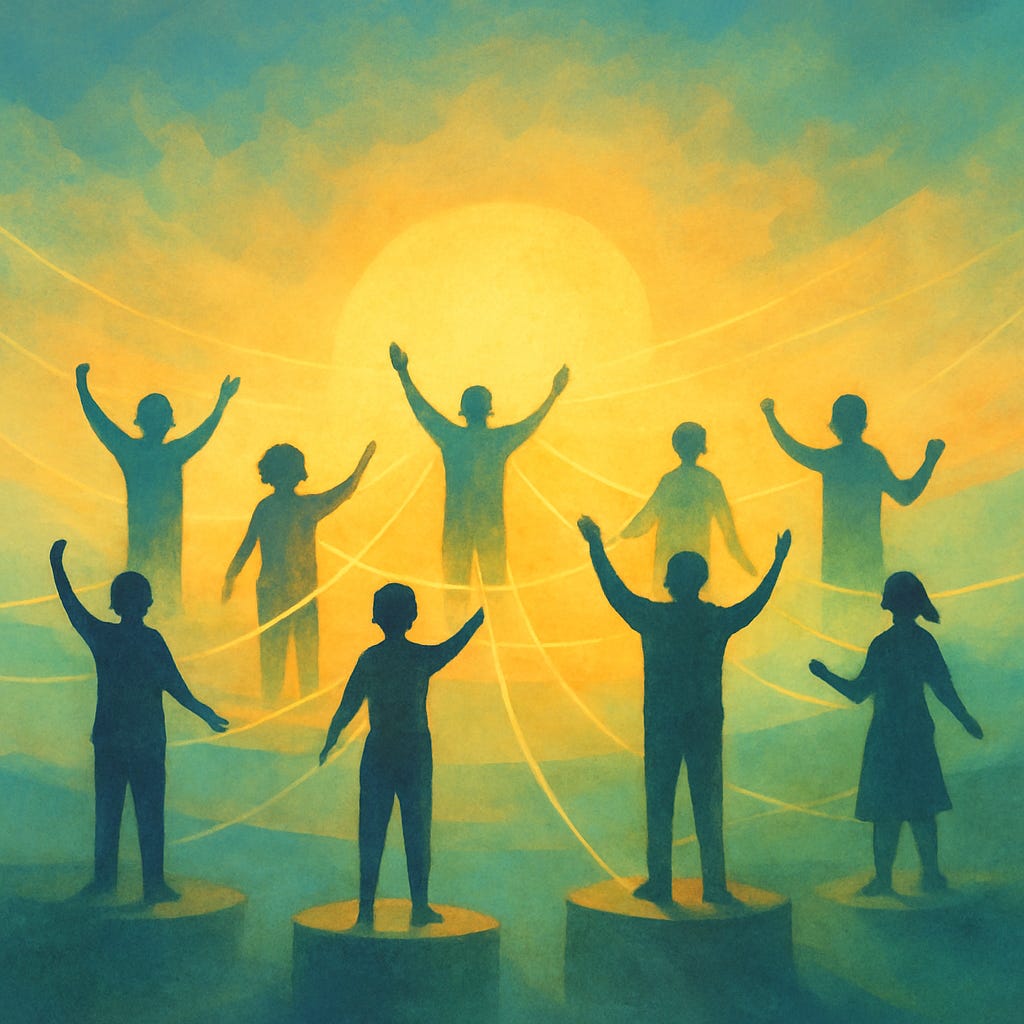


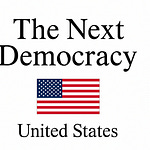
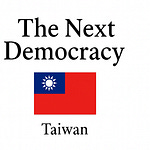
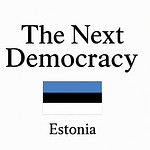

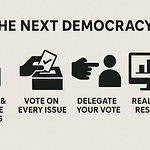

Share this post